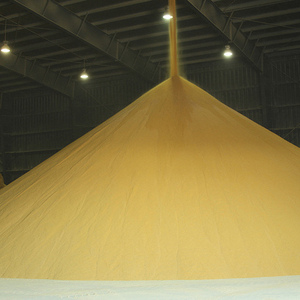Rayeman Elements announces new DDG, grain processing technologies

August 3, 2016
BY Rayeman Elements Inc.
Rayeman Elements Inc. has developed a patented method to cube distillers dried grains (DDGs). The company has also announced a new grain drying system that aims to reduce the risks and costs associated with operating grain dryers.
REI has spent the last 5.5 years, and more than $20 million in research and development efforts to find solutions for many of the problems faced by ethanol producers today. Instead of simply trying to make incremental improvements in the areas of grain drying and animal feed production, REI has developed completely new systems to accomplish these goals and has achieved what everyone said was impossible.
Cattle Feed:
Advertisement
Advertisement
Through the patent-protected innovative process, Rayeman Elements has developed a method that attains optimum cube integrity and nutritional value in a compact and efficient cube, and does not fall apart. Through the use of time-tested equipment, new and patented heating and cooling technology, as well as patented screw geometry, compression, and die design, among other things, the perfect 100 percent DDG cube, which maintains integrity, is created.
Thanks to REI systems, ranchers no longer have to choose between losing their feed product to the ground or the elements, or feeding their livestock useless binding agents.
Grain Drying:
Ethanol producers are very familiar with the risks and costs associated with operating grain dryers. Fire, explosion, waste gas, toxic VOCs, EPA permitting, high cost of insurances, and large capital expense, are all issues that producers who chose to dry their grain deal with on a daily basis. These issues have kept many producers out of the DDG market.
Advertisement
Advertisement
REI’s enterprising, new grain drying system solves all of those concerns. It is safer in that it runs on electricity and only goes to temperatures of up to 250 degrees, eliminating the possibility of explosions due to the “natural gas/high heat/particles in the air” trifecta which often causes these devastating flare-ups. The cost to run it is comparable to, if not less than, conventional dryers, but comes at less of an upfront capital cost. Insurance is economical due to the explosion-proof nature of the equipment and technology. Lastly, VOCs are not emitted into the air and therefore there is (in most states) no need for EPA permitting. It is technologically superior to current drying systems, as well as safer, more cost-effective, and eco-friendly.
Rayeman Elements will continue to develop and make improvements on our existing equipment, so that when it’s in the producer’s hands, it is the very latest and greatest we have to offer. We do full-plant design, set-ups, and cost breakdowns so you have everything you need to make an educated decision on the purchase of our equipment and technology.
Related Stories
The USDA’s Risk Management Agency is implementing multiple changes to the Camelina pilot insurance program for the 2026 and succeeding crop years. The changes will expand coverage options and provide greater flexibility for producers.
EcoCeres Inc. has signed a multi-year agreement to supply British Airways with sustainable aviation fuel (SAF). The fuel will be produced from 100% waste-based biomass feedstock, such as used cooking oil (UCO).
SAF Magazine and the Commercial Aviation Alternative Fuels Initiative announced the preliminary agenda for the North American SAF Conference and Expo, being held Sept. 22-24 at the Minneapolis Convention Center in Minneapolis, Minnesota.
Saipem has been awarded an EPC contract by Enilive for the expansion of the company’s biorefinery in Porto Marghera, near Venice. The project will boost total nameplate capacity and enable the production of SAF.
Global digital shipbuilder Incat Crowther announced on June 11 the company has been commissioned by Los Angeles operator Catalina Express to design a new low-emission, renewable diesel-powered passenger ferry.
Upcoming Events










